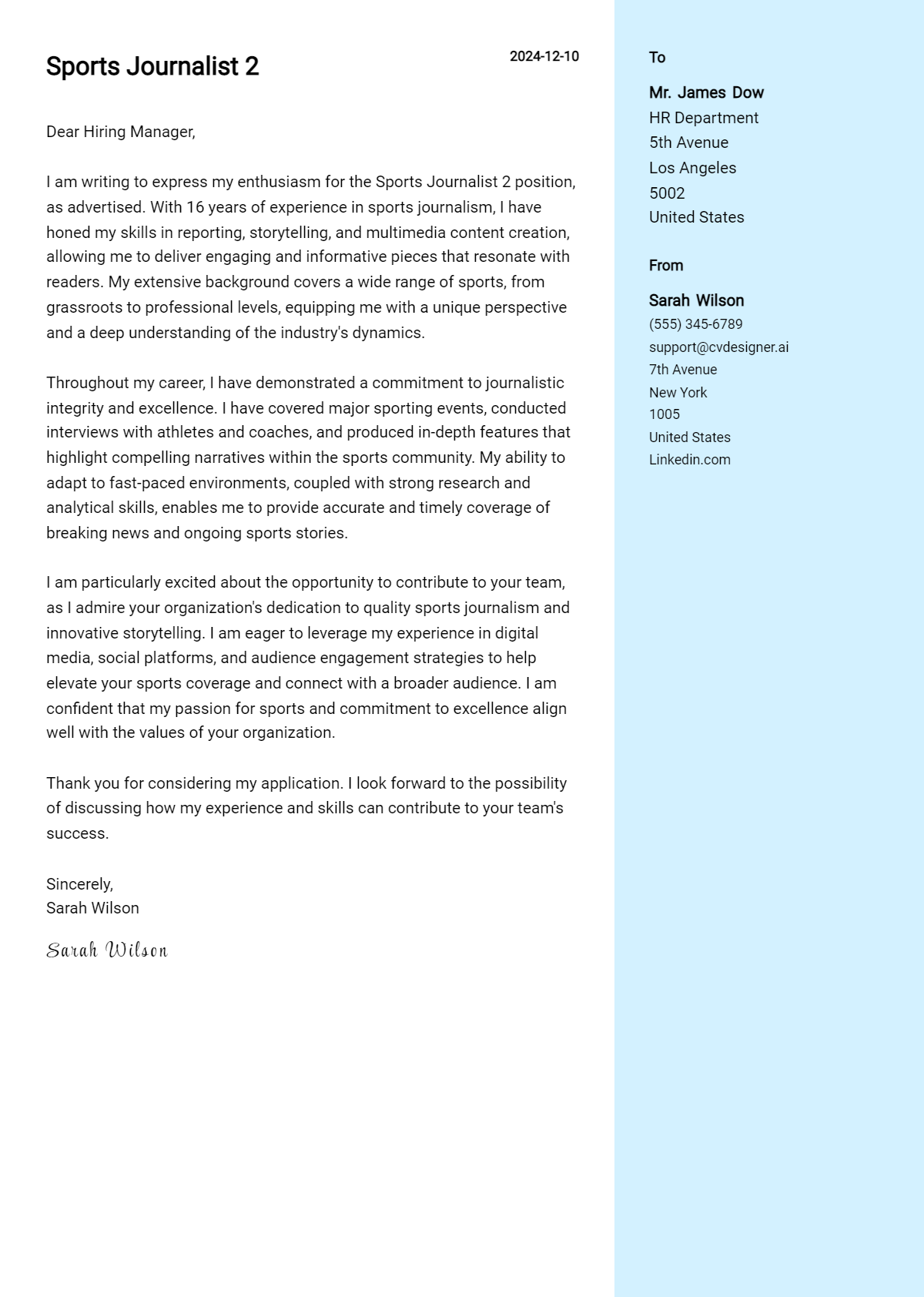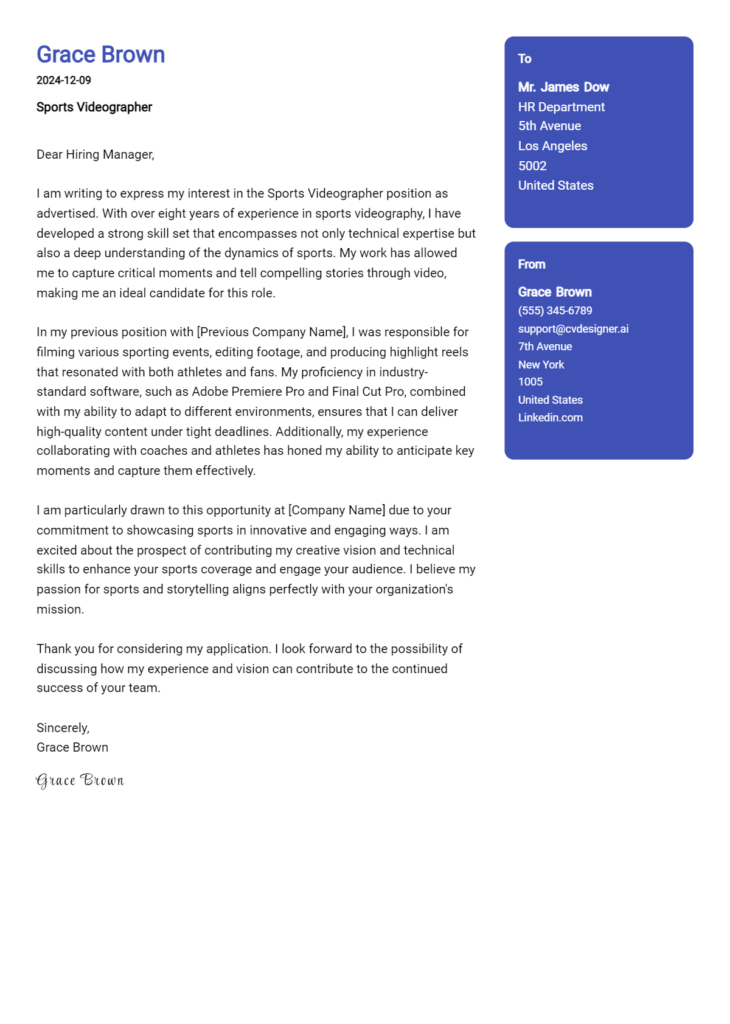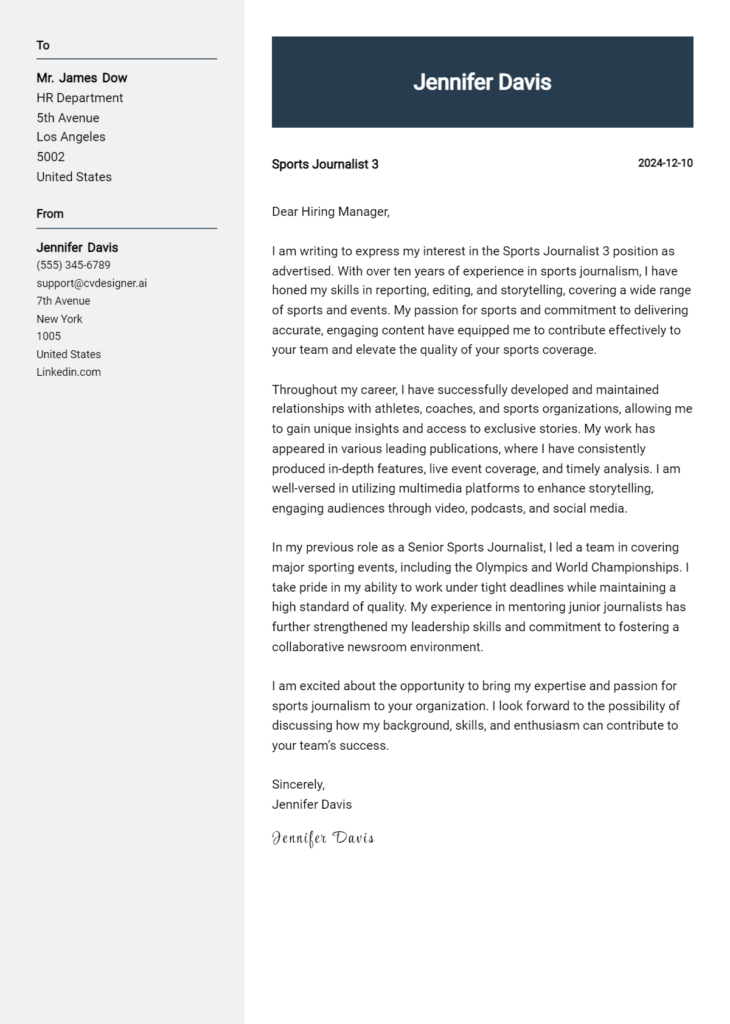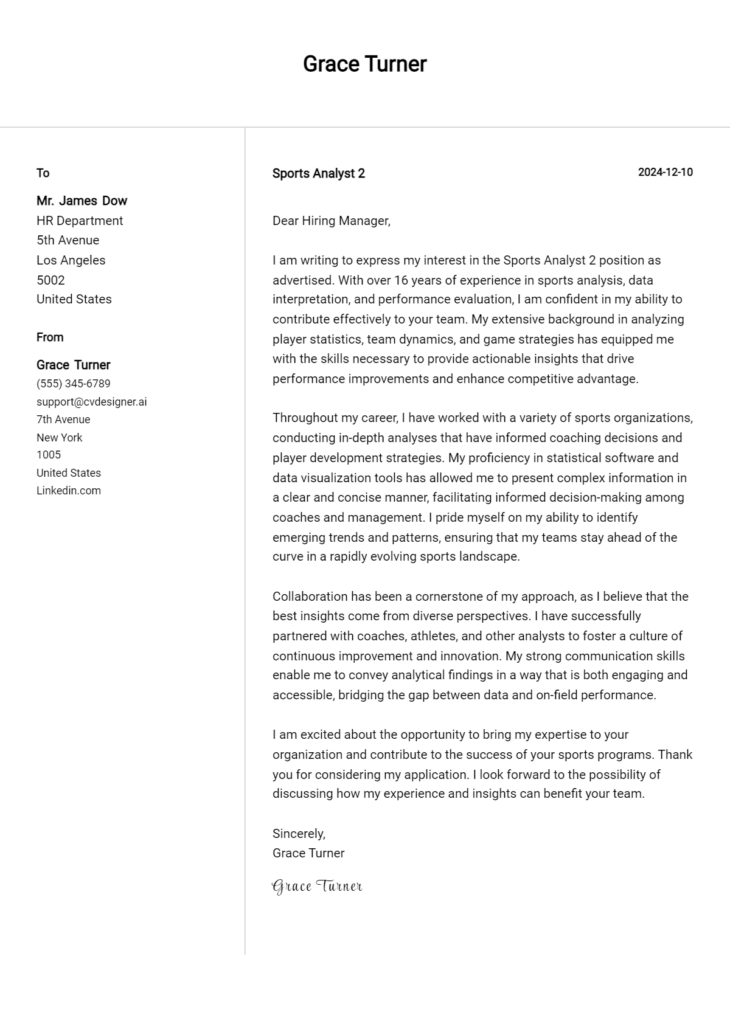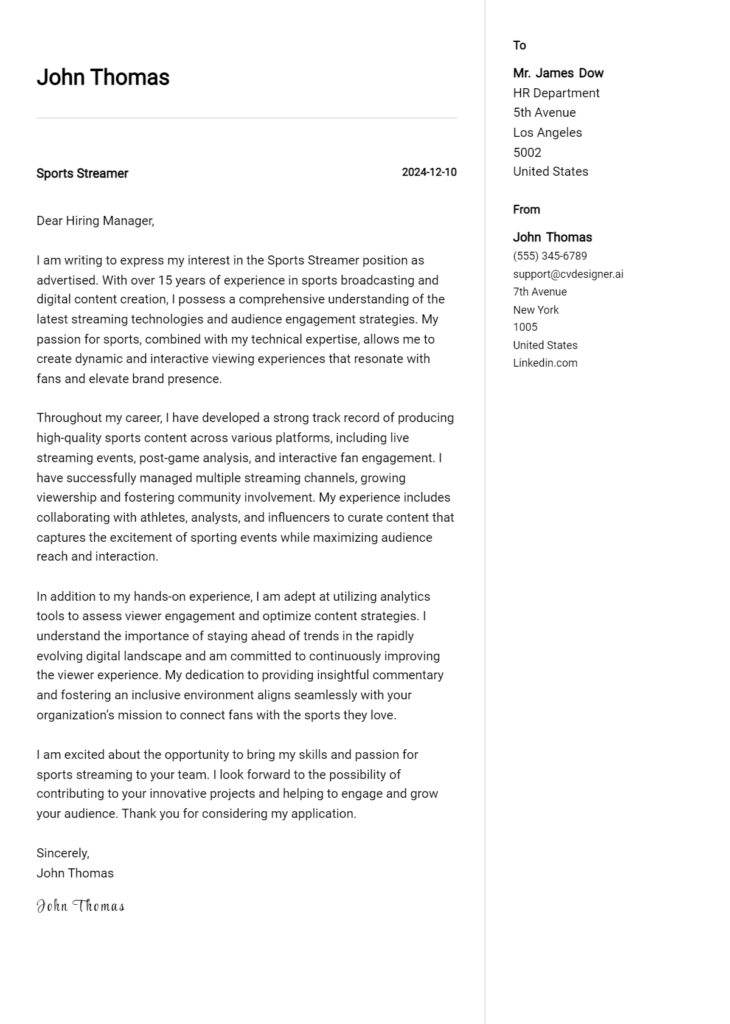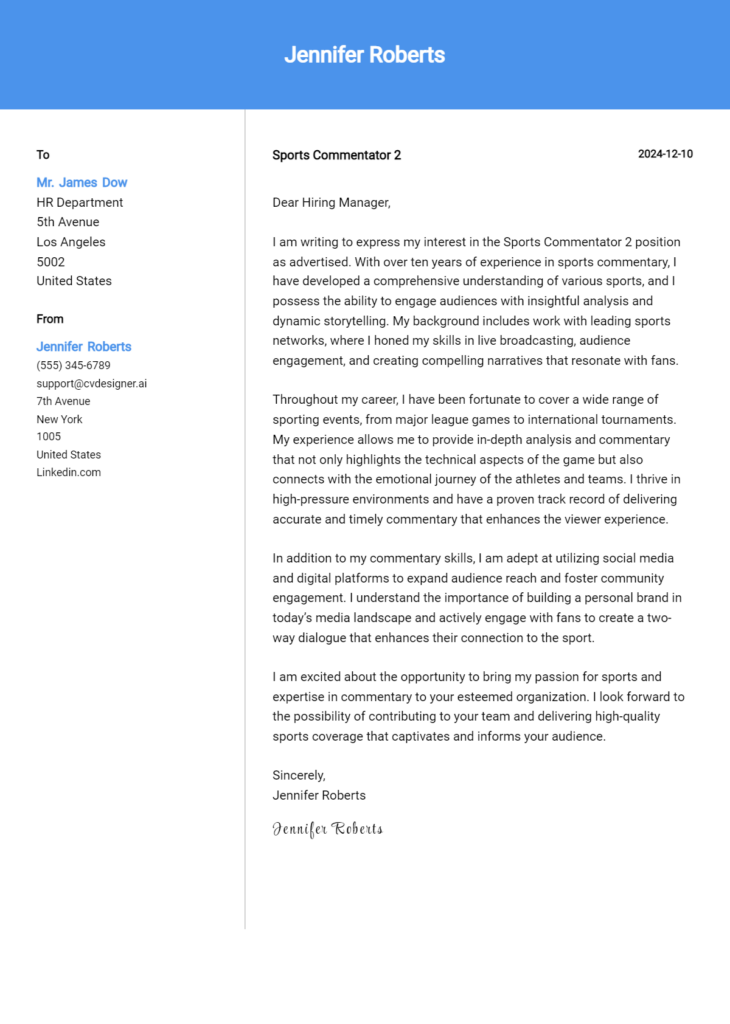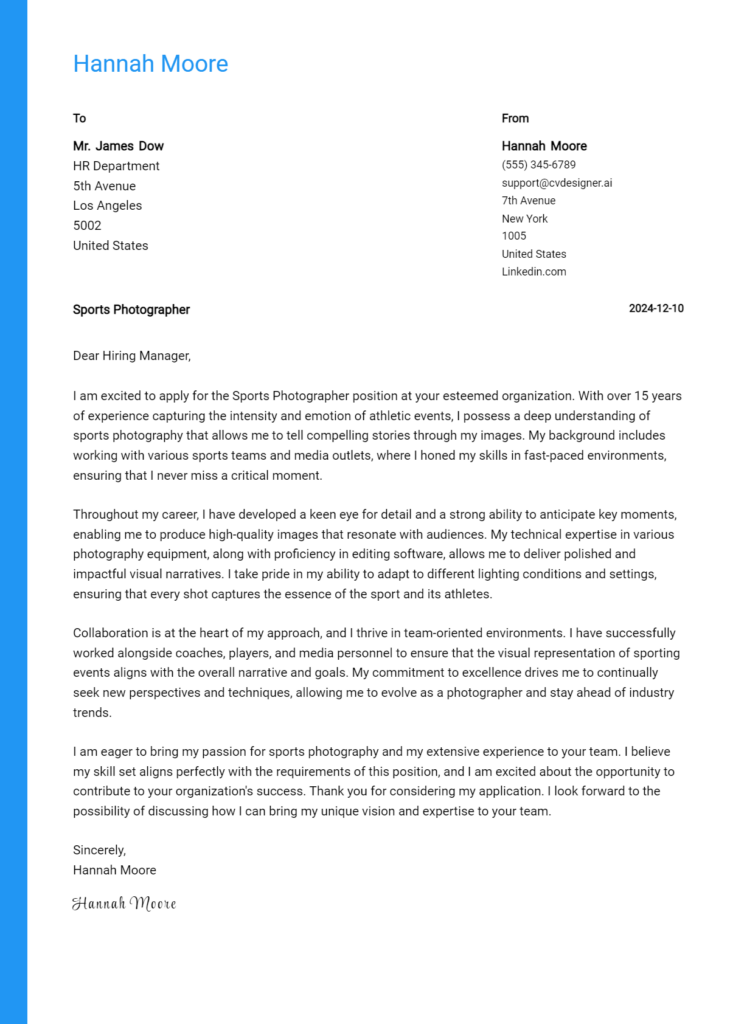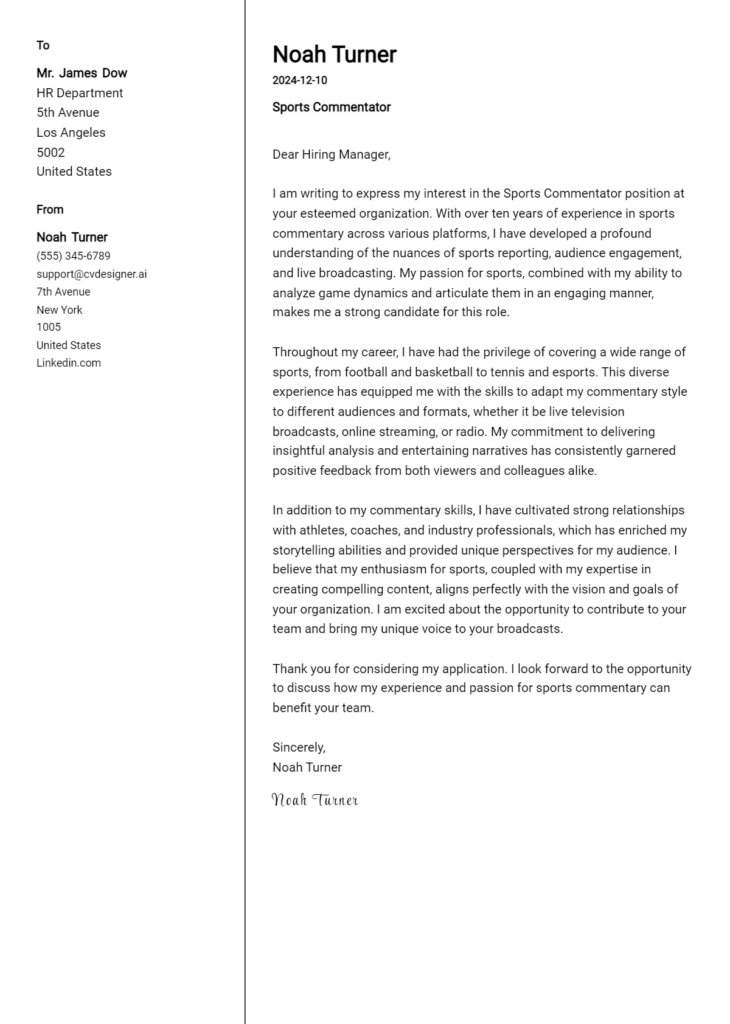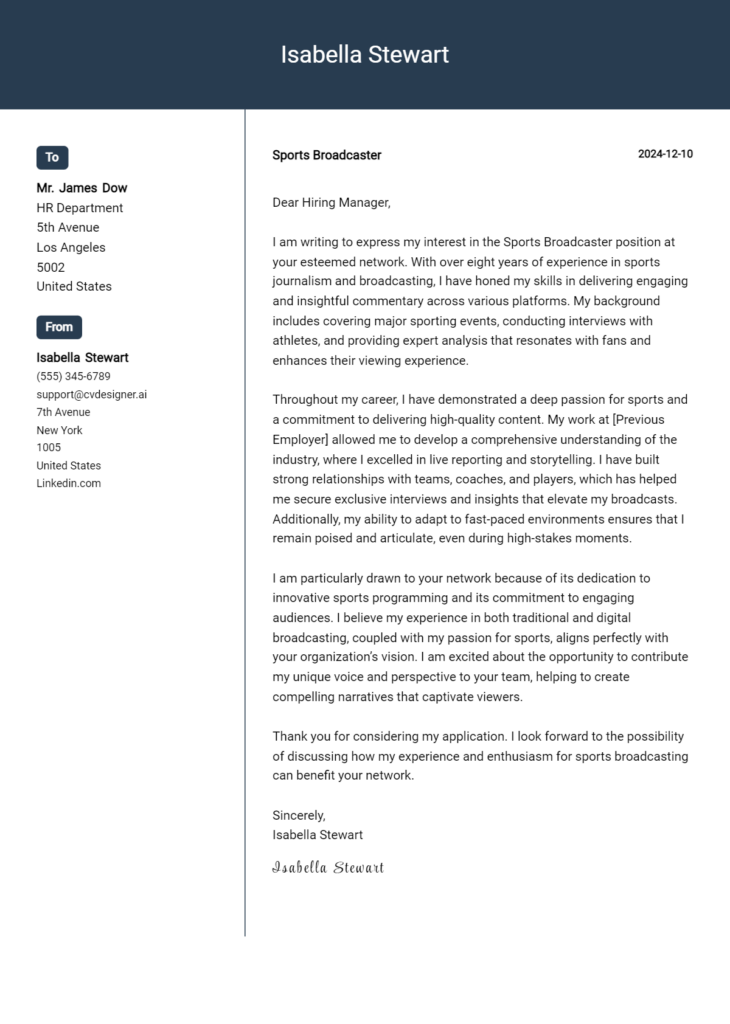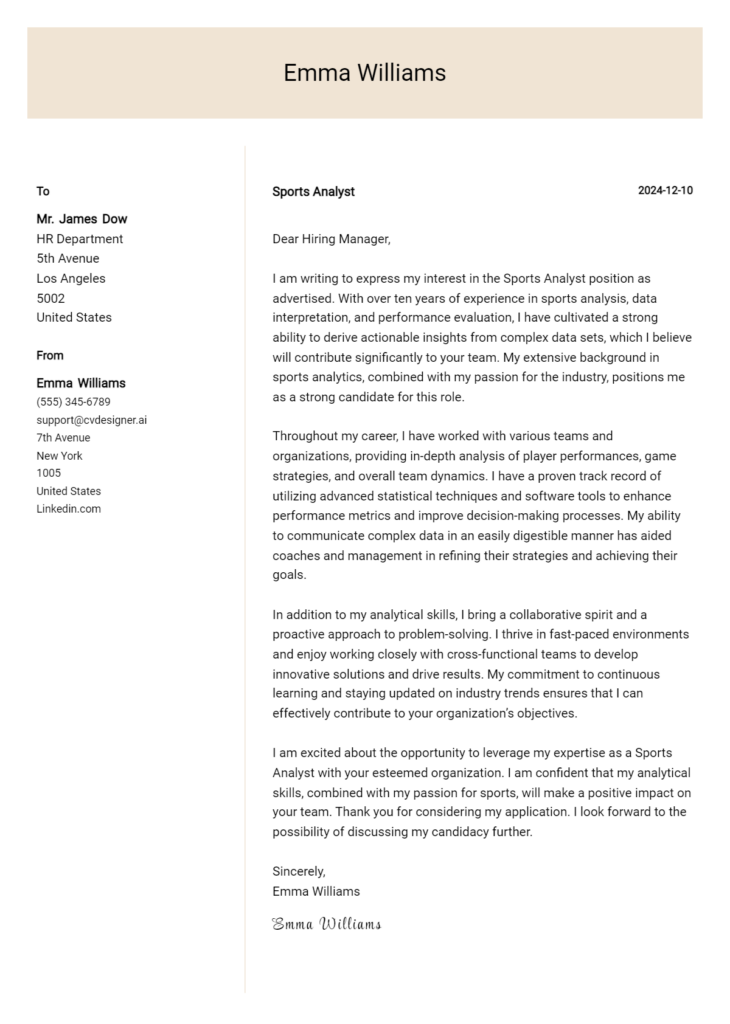Sports Journalist 2 Cover Letter Examples
Explore additional Sports Journalist 2 cover letter samples and guides and see what works for your level of experience or role.
How to Format a Sports Journalist Cover Letter
Crafting a compelling cover letter is essential for sports journalists, as it not only showcases your writing skills but also demonstrates your understanding of the dynamic world of sports. The way you format your cover letter can significantly impact the hiring manager's perception of your professionalism and ability to engage an audience. A well-structured cover letter reflects your attention to detail and passion for storytelling—qualities that are crucial in journalism.
In this guide, we'll outline the key components of a sports journalist cover letter, providing valuable insights and specific examples to help you create an eye-catching document.
We'll focus on the essential elements of a professional cover letter, including:
- Cover Letter Header
- Cover Letter Greeting
- Cover Letter Introduction
- Cover Letter Body
- Cover Letter Closing
Each section is vital for effectively communicating your qualifications and enthusiasm for the role. Let’s delve into the details of each part and learn how to make your sports journalist cover letter stand out.
Importance of the Cover Letter Header for a Sports Journalist
The cover letter header is a critical component of a Sports Journalist's application as it sets the tone for professionalism and clarity. This section should include essential information such as your contact details, the date of the application, and the recipient's details. A well-structured header not only provides the necessary information but also reflects your attention to detail, which is vital in the field of journalism. A strong header can create a positive first impression, while a poorly formatted one may lead to confusion or a lack of seriousness about the application.
Strong Example
John Doe 123 Sports Lane Los Angeles, CA 90001 (123) 456-7890 johndoe@email.com October 1, 2023 Jane Smith Editor-in-Chief Sports Daily News 456 Media Blvd New York, NY 10001
Weak Example
johndoe@email.com Sports Daily News 456 Media Blvd New York, NY 10001
The Importance of a Strong Greeting in Your Cover Letter
The greeting of your cover letter is a crucial element that sets the tone for the entire letter. A well-crafted greeting demonstrates professionalism and shows that you have taken the time to personalize your application by addressing the hiring manager directly. This initial connection can create a positive impression and encourage the reader to continue engaging with your letter. To avoid sounding generic, it is essential to research the recipient's name, which can often be found on the company's website or LinkedIn. A personalized greeting reflects your attention to detail and genuine interest in the position.
Strong Example
Dear Mr. Johnson,
Weak Example
To Whom It May Concern,
The Importance of a Well-Crafted Cover Letter Introduction for a Sports Journalist
A well-crafted cover letter introduction is essential for any Sports Journalist seeking to make a mark in the competitive field of sports media. This opening paragraph serves as the first impression for hiring managers, and it can make or break the chances of securing an interview. An effective introduction not only captures attention but also expresses genuine interest in the role while showcasing key skills and achievements that align with the job requirements. A strong introduction will set the tone for the rest of the cover letter and compel the reader to learn more about the candidate's qualifications.
Strong Example
Dear [Hiring Manager's Name], As an avid sports enthusiast and seasoned journalist with over five years of experience covering high-stakes events, I was thrilled to discover the opening for the Sports Journalist position at [Company Name]. My work has not only been featured in national publications but has also earned accolades for its engaging storytelling and insightful analysis. I am eager to bring my passion for sports and my proven ability to connect with audiences to your esteemed team.
Weak Example
To Whom It May Concern, I am applying for the Sports Journalist position at your company. I think I would be good at this job because I like sports and have written some articles before. I hope you consider my application.
Cover Letter Body for Sports Journalist
The cover letter body for a Sports Journalist serves as a vital section that allows candidates to effectively showcase their skills, experiences, and the unique value they bring to a media organization. This portion of the cover letter should highlight relevant projects, such as in-depth interviews, investigative articles, or coverage of significant sporting events, demonstrating the candidate's ability to engage audiences and deliver compelling narratives. By detailing specific accomplishments, such as increased readership or awards won for exemplary reporting, candidates can illustrate their impact in previous roles and their potential contributions to the prospective employer.
Strong Example
I am excited to apply for the Sports Journalist position at your esteemed publication. In my previous role at Sports Daily, I successfully led a team in covering the XYZ Championship, resulting in a 25% increase in web traffic during the event. My investigative piece on athlete mental health, which was featured in the national spotlight, was awarded the "Best Feature Article" by the National Sports Writers Association. I pride myself on my ability to connect with athletes and deliver stories that resonate with readers, and I am eager to bring my passion for sports journalism to your team.
Weak Example
I want to be a Sports Journalist because I like sports. I have written some articles for my school newspaper about local games. I believe I could do well in this job because I watch sports on TV a lot. I hope to get a chance to work for your company someday.
Importance of Cover Letter Closing for a Sports Journalist
The closing paragraph of a cover letter is crucial as it serves to summarize your qualifications, reiterate your enthusiasm for the role, and encourage the hiring manager to take the next steps, such as reviewing your resume or scheduling an interview. A strong closing can leave a lasting impression, showcasing your professionalism and eagerness, while a weak closing may undermine your overall application.
Strong Example
Thank you for considering my application for the Sports Journalist position at [Company Name]. With my extensive background in sports writing and a passion for storytelling, I am excited about the opportunity to contribute to your team. I look forward to the possibility of discussing how my skills and experiences align with the goals of [Company Name]. Please feel free to contact me at your earliest convenience to schedule an interview. Thank you once again for your time and consideration.
Weak Example
I guess that's it. I hope you like my resume. Let me know if you want to talk or something. Thanks.
When applying for a position as a Sports Journalist, your cover letter is your first opportunity to make a lasting impression. This document should not only highlight your passion for sports journalism but also demonstrate your technical skills, problem-solving abilities, knowledge of the sports development life cycle (SDLC), teamwork experience, and commitment to continuous learning. The following tips will guide you in crafting an effective cover letter that captures the attention of hiring managers and showcases your qualifications.
Tips for Writing an Effective Cover Letter for Sports Journalists
Begin with a Compelling Opening Statement Start your cover letter with an engaging introduction that reflects your enthusiasm for sports journalism. Mention the specific position you are applying for and briefly explain why you are a strong candidate. This sets the tone for the rest of your letter and encourages the reader to learn more about you.
Highlight Technical Skills Sports journalism requires a range of technical skills, including proficiency in digital media, video editing, and data analysis. Clearly mention these skills in your cover letter, providing examples of how you have applied them in previous roles. This not only shows that you have the necessary technical capabilities but also that you can adapt to the evolving landscape of sports media.
Demonstrate Problem-Solving Abilities Use specific examples to illustrate your problem-solving skills. Discuss a challenging situation you faced in your previous work, how you approached it, and the positive outcome that resulted. This demonstrates your ability to think critically and find solutions, which is crucial in the fast-paced world of sports journalism.
Showcase Knowledge of the Sports Development Life Cycle (SDLC) Understanding the SDLC in sports can set you apart from other candidates. Highlight any experiences you have that relate to the various stages of an athlete's career or sports event management. This knowledge indicates that you can provide insightful coverage and analysis, making your work more valuable to your employer.
Emphasize Teamwork and Continuous Learning Sports journalism often involves collaboration with other journalists, editors, and sports professionals. Mention your experiences working in teams and how you contribute to achieving common goals. Additionally, express your commitment to continuous learning, whether through attending workshops, pursuing certifications, or staying updated with industry trends. This shows that you are proactive and dedicated to improving your craft.
For more assistance in crafting your cover letter, consider using cover letter templates or try out a cover letter builder to create a polished and professional document that showcases your unique qualifications.
Common Mistakes to Avoid in a Sports Journalist Cover Letter
Crafting a compelling cover letter is essential for standing out in the competitive field of sports journalism. Avoiding common pitfalls can significantly enhance your chances of landing an interview. Here are several mistakes to steer clear of:
Generic Greetings: Using "To Whom It May Concern" is impersonal. Always try to find the hiring manager’s name for a personalized touch.
Lack of Specificity: Failing to mention specific experiences or skills relevant to the job can make your application forgettable. Tailor your letter to highlight your relevant achievements in sports journalism.
Too Lengthy: A cover letter should be concise and to the point. Aim for a single page that effectively communicates your qualifications without overwhelming the reader.
Ignoring the Job Description: Not addressing the requirements mentioned in the job listing can indicate a lack of attention to detail. Make sure to align your qualifications with what the employer is seeking.
Spelling and Grammar Errors: Typos can undermine your professionalism. Always proofread your letter or use tools to catch mistakes before submission.
Overly Formal Language: While professionalism is key, using overly complex language can make your writing sound stilted. Aim for a conversational tone that reflects your personality.
Neglecting to Include Metrics: When discussing your achievements, failing to include quantifiable results can lessen your impact. Use statistics or concrete examples to illustrate your success in previous roles.
For more guidance, you can explore various cover letter examples and learn about the appropriate cover letter format to ensure your application stands out for all the right reasons.
Cover Letter FAQs for Sports Journalist
What should I include in my cover letter as a Sports Journalist?
In your cover letter, you should include your passion for sports, relevant experience, and specific skills that make you a strong candidate for the position. Highlight your educational background, such as a degree in journalism or communications, and any internships or freelance work you’ve done in the sports field. Mention your proficiency in various forms of media—written articles, broadcast journalism, or digital content creation. It's also effective to showcase your knowledge of specific sports or teams, emphasizing your ability to engage with fans and produce compelling stories. Lastly, express your enthusiasm for the opportunity and how you can contribute to the publication or organization.
How can I demonstrate my writing skills in my cover letter?
To effectively demonstrate your writing skills in your cover letter, adopt a clear, engaging, and concise writing style that reflects your journalistic voice. Use active verbs and avoid jargon unless it’s relevant to the position. Consider including a brief story or anecdote that showcases your ability to capture the essence of a sports event or athlete. You can also mention specific articles or pieces you've written, providing links if possible. This not only proves your writing capabilities but also directs the hiring manager to your work. Ensure that your cover letter is error-free, as this reflects your attention to detail—an essential trait for any sports journalist.
How long should my cover letter be for a Sports Journalist position?
Your cover letter should ideally be one page long, consisting of three to four paragraphs. This length allows you to provide enough detail about your qualifications and experiences without overwhelming the reader. Aim for around 250-400 words to ensure you remain concise and focused. Each paragraph should have a clear purpose: an introduction that grabs attention, a body that outlines your experience and skills, and a conclusion that reiterates your enthusiasm and requests an interview. Always remember to format your cover letter professionally, using readable fonts and appropriate spacing to enhance readability.
Should I customize my cover letter for each application?
Yes, customizing your cover letter for each application is crucial. Tailoring your cover letter demonstrates your genuine interest in the specific position and organization. Research the publication or media outlet to understand its style, audience, and current sports coverage. Use this information to align your experiences and skills with the company's needs and values. Mention specific articles or projects from the organization that resonate with you and explain why you would be a good fit. Customization not only sets you apart from generic applications but also shows your commitment to contributing meaningfully to the team.
Build your Cover Letter in minutes
Use an AI-powered cover letter builder and have your letter done in 5 minutes. Just select your template and our software will guide you through the process.

